Indoor classroom games are a fantastic way to inject a dose of fun and excitement into the traditional learning environment.
These games not only break the monotony of lectures and textbooks but also promote active engagement, teamwork, and critical thinking among students.
Whether you’re a teacher looking to add some zest to your lessons or a student seeking a refreshing change of pace, fun indoor classroom games offer a captivating and educational experience that can make learning an enjoyable adventure.
We’ll explore a variety of creative indoor classroom games that can transform your classroom into a dynamic and interactive space for both students and educators alike.
So, let’s dive in and discover the world of educational fun waiting to be unlocked within the four walls of your classroom!
Scavenger Hunt:
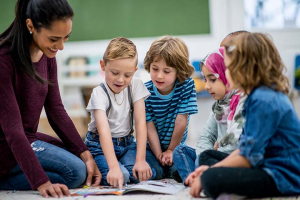
One of the most exciting indoor classroom games is a scavenger hunt. It encourages students to apply their problem-solving skills and teamwork in a fun and educational way. You can organize a scavenger hunt by hiding clues or objects related to your lesson plan throughout the classroom. Students work in teams, following the clues to solve riddles or find specific items. This game not only makes learning interactive but also fosters healthy competition and boosts students’ ability to think critically and work together.
Jeopardy! Quiz Show:

Transform your classroom into a quiz show stage by playing a game of Jeopardy! This classic game is perfect for reviewing and reinforcing the material covered in your lessons. Divide the class into teams and create a game board with different categories and point values. Students take turns selecting questions and answering them, earning points for correct responses. Jeopardy! not only makes learning fun but also tests students’ knowledge retention, making it an effective tool for exam preparation.
Pictionary Vocabulary Challenge:
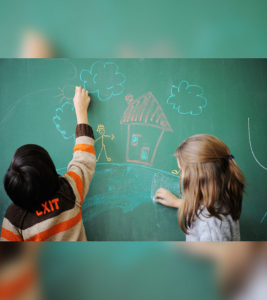
Pictionary is a fantastic game to reinforce vocabulary and language skills. Divide the class into teams and provide each team with a list of words related to the lesson. One student from each team must draw the word on the board while their teammates try to guess it within a time limit. This game enhances communication and comprehension skills while making learning enjoyable and memorable.
Related: 25 Fun Indoor Games to Play Without Anything
Storytelling Relay:
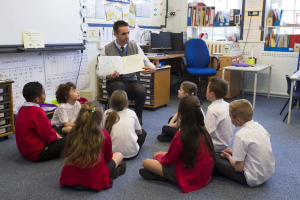
Foster creativity and teamwork with a storytelling relay game. Divide the class into groups and provide each group with a sentence starter related to the lesson. The first student in each group writes a sentence and passes it to the next student, who continues the story. Keep passing the story until each student has contributed, and then have them share their imaginative narratives with the class. This activity not only reinforces the lesson’s content but also encourages students to think creatively and collaborate.
Science Experiment Races:

For science classes, turn learning into a thrilling race by organizing science experiment races. Set up stations with different experiments related to the curriculum, and divide the class into groups. Each group must complete a series of experiments correctly and efficiently. The first team to successfully finish all experiments wins. This game not only makes science concepts come to life but also emphasizes the importance of precision and scientific method.
Math Bingo:

Transform math practice into an exciting game of Bingo. Create Bingo cards with math problems or equations instead of numbers. Call out math questions, and students mark their answers on their cards. The first student to complete a row or column correctly shouts “Bingo!” This game not only reinforces math skills but also adds an element of competition and anticipation, making learning math more enjoyable.
Art Gallery Showcase:

Encourage creativity and appreciation for art with an art gallery showcase. Assign each student or group of students a specific art style, artist, or time period to research and emulate. They can create artworks inspired by their assigned topic and then curate an art gallery within the classroom. Invite the class to walk through the gallery, discussing the art, its significance, and the artists. This game helps students connect with art history and develop critical thinking skills.
History Timeline Challenge:
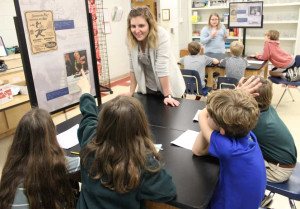
Bring history to life by organizing a history timeline challenge. Provide students with key historical events, figures, or dates and have them work in teams to arrange these items on a timeline correctly. This activity helps students visualize the chronological order of historical events, reinforcing their understanding of history in an engaging and interactive way.
Related: 20 Exciting Indoor Games for 6 to 12 Year Olds
Scientific Discovery Show-and-Tell:

Encourage students to become science communicators with a scientific discovery show-and-tell. Assign each student or group a notable scientific discovery or invention, and have them create presentations that explain the discovery’s significance, the scientist behind it, and its impact on society. This activity promotes research skills, public speaking, and an appreciation for scientific achievements.
Geography Treasure Hunt:

Explore the world from the comfort of your classroom with a geography treasure hunt. Create clues or riddles related to different countries, landmarks, or geographical features. Students work in teams to decipher the clues and find the “treasures” (information or objects) hidden throughout the classroom. This game not only teaches geography but also improves research and problem-solving skills.
Literature Book Swap:

Promote a love for reading and discussions with a literature book swap. Have each student select a book they’ve recently read and enjoyed. They can write a brief summary and review of the book. Then, organize a book swap event where students exchange their books and engage in conversations about the stories, characters, and themes. This activity encourages reading comprehension and fosters a reading community in your classroom.
Science Mystery Detectives:

Turn your classroom into a science detective agency with a mystery-solving game. Create a fictional science mystery related to your curriculum and provide clues or evidence. Students work in teams to analyze the information, conduct experiments, and solve the mystery. This game not only makes science exciting but also encourages critical thinking and scientific inquiry.
Music Trivia Quiz:

Enhance music appreciation by hosting a music trivia quiz. Create a list of questions related to music history, genres, composers, and famous musicians. Divide the class into teams and take turns asking questions. Correct answers earn points, and you can even play short musical clips for identification. This game reinforces music knowledge while fostering healthy competition.
Foreign Language Word Relay:
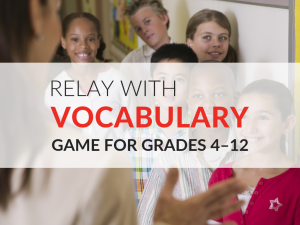
For foreign language classes, organize a word relay race. Create a list of vocabulary words or phrases related to the language being studied. Divide the class into teams, and students take turns running to a board to write or translate a word or phrase. The team that completes the relay first with correct translations wins. This game helps reinforce language skills and encourages quick thinking in the target language.
Current Events Debate:

Promote critical thinking and discussion by organizing a current events debate. Assign students different current news articles to research and summarize. Then, hold a structured debate where students argue their points of view while referencing their articles. This game not only keeps students informed about the world but also enhances their public speaking and persuasive skills.
Creative Writing Relay:
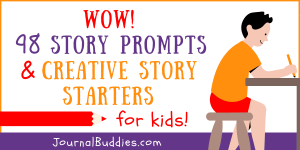
Spur creativity and storytelling skills with a creative writing relay. Form teams of students and give each team a story starter or a sentence to begin a story. Set a timer for a short interval (e.g., 5 minutes), and the first student in each team writes the next sentence or part of the story. After the timer goes off, they pass their papers to the next team member, who continues the story. This cycle repeats until each team has a completed story. Reading the finished stories aloud can be both entertaining and insightful for the class.
Historical Role-Play:
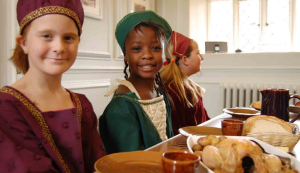
Bring history to life with historical role-play. Assign each student a historical figure or character related to the topic you’re covering. Have them research and prepare short monologues or dialogues that capture the essence of their assigned character. Then, organize a classroom “historical convention” where students dress up as their characters and engage in discussions or debates, allowing them to embody and understand historical perspectives more deeply.
Science Olympics:
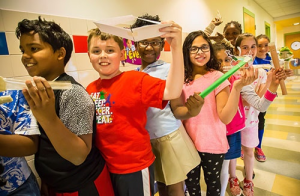
Transform your classroom into a science arena with a Science Olympics competition. Design a series of science challenges or experiments related to your curriculum. Divide students into teams and have them compete in various scientific tasks. Assign points for successful completion, accuracy, and creativity. This game not only reinforces scientific concepts but also promotes teamwork and critical thinking.
Foreign Language Karaoke:

Inspire a love for poetry and self-expression with a poetry slam. Encourage students to write and perform their own poems related to the themes or subjects they’ve been studying. They can deliver their poems individually or in teams, and you can even invite guest judges or fellow students to score their performances. Poetry slams foster creativity, public speaking skills, and a deeper connection to literature.
Environmental Scavenger Hunt:
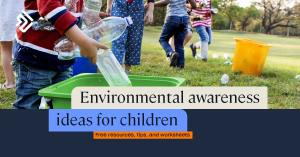
Promote environmental awareness and science knowledge with an environmental scavenger hunt. Create a list of items or clues related to nature and the environment, such as specific leaves, rocks, or animal tracks. Students can work individually or in teams to find and identify these items, helping them connect with the natural world and reinforcing ecological concepts.
Related: Why is Preschool Important for Kids?

